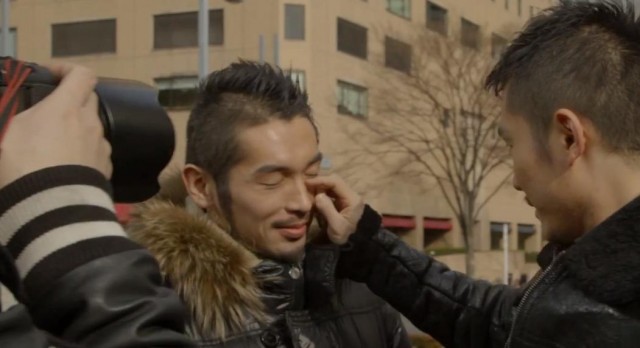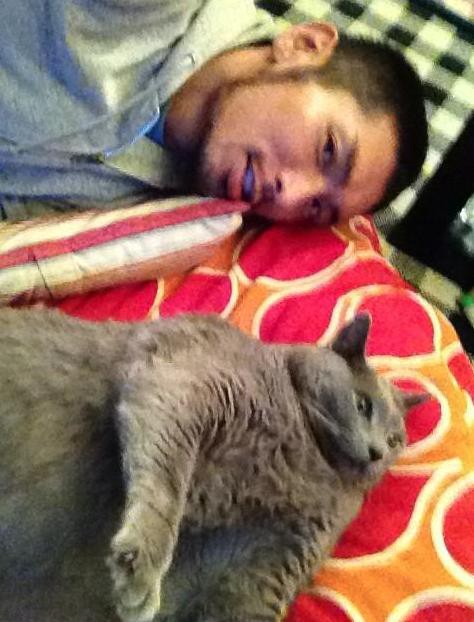Life After Koh Masaki
by Rich Bellis

Koh Masaki was Japan’s foremost gay porn star when he died one month ago today. “It must have taken him a lot of courage to decide to live in Japan. I’ve realized that recently,” Masaki said, about his partner, Tenten, a model and Chinese expatriate that he met on a train home from a Lady Gaga concert. They were talking to the photographer Keiichi Nitta for a recent video series profiling gay couples for Vice Japan. In the video, Masaki, soft-spoken and with a close-cropped beard circling his angular face, never talks explicitly about his work in adult film, but his many fans would have had no trouble recognizing him.
“It’s my duty to take care of him,” Masaki said, glancing over at Tenten.
By the time he died from peritonitis after an appendix operation, at just 29, Masaki had established a celebrity persona in a business where such a thing hadn’t existed before. Japanese censorship laws require blurring genitalia, but social stigma leads many performers (regardless of gender) to obscure their faces, too. Dark sunglasses, hats and blacked-out swimming goggles are common accessories in an industry whose overall value has been estimated at around $20 billion.
As the Internet and social media continue to transform gay life, particularly in Southeast Asia, Masaki’s career hints at one of its biggest contradictions: greater connectedness isn’t necessarily driving a push for social progress — at least not in all the ways familiar in the West. By forgoing anonymity, Masaki didn’t set out to remake society. Still, his decision gave many gay men more than just a recognizable face in the porn they watched. He created a role model who not only enjoyed gay sex but openly identified with it. What’s more, Masaki seemed to have thought it his duty to look out for them, too.
Gay rights and protections in the region are scarce and unevenly distributed. Prohibitions against gay sex remain on the books in several countries, often as vestiges of colonial law, and most of the places where it’s legal changed their statutes only within the last two decades. In recent years, anti-discrimination measures were adopted in Japan and the Philippines, but only at municipal levels. And while there’s notably little resistance to same-sex relationships in Buddhist and Shinto traditions, none are officially recognized in any of the countries where those religions are widely practiced.
Major cities like Tokyo and Osaka have long been hubs of gay life, but today international crowds flock to circuit parties in Bangkok and Manila, bringing commercial sponsorship in their wakes. Taipei’s annual pride parade now draws up to 50,000 people to the city, while Vietnam held its first one ever in the streets of Hanoi last August. The same month, two women were wed in a Buddhist ceremony in Taiwan. When a lesbian couple followed suit at Tokyo Disney Resort this year, Masaki tweeted his congratulations.
Such changes are unthinkable outside the digital age. A backdrop of political advancements around the world gives many of them some air of inevitability. The Internet’s expanding reach is largely responsible for Japan’s first high-profile gay porn star too. Few industries have better adapted to cyberculture than porn, consumed in private, even as delivery systems multiply and go mobile.
But the more it expands, the less Southeast Asia’s gay consumer culture, particularly, is defined by sex. Around the world, gay men searching the web for porn have proven equally eager to seek out one another for anonymous hookups. There’s now a growing market just for dating and hanging out, too. An app that recently launched in China bills itself as the first gay social network to base matches on common interests beyond sexual proclivities.
And yet the Internet may be limiting gay people’s forays into public life to the same extent that it’s fostering community — or at least activity — online. There are even reports that Shinjuku, Tokyo’s well-established gay district, is deteriorating as a result of social networking. Meanwhile films, events and merchandise geared toward a gay audience are entering the marketplace, but now they’re frequently the offline tip of an otherwise digital iceberg.
Masaki, much of whose adult work was promoted and distributed on the Internet, became a spokesmodel for an underwear brand and appeared in a gay-themed Thai film series. He was also cast in a music video by the pop star Ayumi Hamasaki, in which he was shown kissing Tenten, still an unfamiliar tableau in the mainstream media.
By and large, though, the audiences for these undertakings were drawn from the fans of his porn. In the Vice interview, Masaki confides that “there’s a reason” he regularly turns down invitations to appear on national television. Contrasting the crass gay stereotype common in Japan with his more masculine presentation, he said, “people just aren’t going to get it.”
It’s a revealing remark. Aside from a few outlandish entertainers, gay public figures are rare in Southeast Asia. The 1990s Cantopop star Leslie Cheung, best known in the West for his roles in Wong Kar-wai’s films, skirted rumors about his sexuality for years before characterizing himself as bisexual in 2001. Social censure has made perilous gambles of such revelations. Hong Seok-cheon was a popular TV host in South Korea when he came out as gay in 2000, only to be fired from his variety show and heaped with abuse. He remains a public presence urging greater acceptance but still speaks bitterly about the personal and professional costs of that disclosure. Sometimes outcomes are tragic. A popular young actor and model, following Hong’s lead in 2008, committed suicide after an intense backlash. Cheung, suffering from depression throughout his wildly successful careers, had done the same in 2003.
So it’s reasonable to expect a gay porn star, especially, to fly beneath the mainstream’s radar. In the West, too, gay sex — and its commoditized forms in particular — isn’t usually included in talk of gay visibility, to the ritual consternation of some. Masaki’s comment suggests he wasn’t interested in making anybody “get it” who didn’t already. When Nitta asks whether he and Tenten hold hands in public, his response is deferential, arguably to a fault: “Some people don’t want guys holding hands in public. We don’t want to upset them.”
“Do you act out of concern for the straight people?” Nitta questioned.
“Of course,” he said. “I mean, we’re not the only ones there.”
That could be a matter of either personal or cultural temperament, or of some other rationale unknown. And where quiet tolerance is often more common than outright hostility, the very absence of a vocal opposition makes it difficult to rally support for change. That reluctance to attract attention continues to frustrate activists pushing for marriage equality and other protections, but it’s an attitude other gay men appear to share.
Masaki’s clear sense of the line dividing gay from straight life probably made him easier to identify with. Given the various risks associated with being openly gay all across Asia, it’s not difficult to understand the importance of having of a well-defined subculture to subscribe to, even — and sometimes particularly — one largely hidden from public view. Political engagement can threaten the very lifestyles it’s meant to improve, especially at first. That takes courage. In a different, perhaps no less courageous way, Masaki helped shape a sense of community that can nonetheless seem insular, complacent, or even invisible from the outside. Perspective matters, though. It’s easier to think of porn stars as sex symbols than as models of gay identity. Before Masaki, who was both, there wasn’t much in the way of either. So far it isn’t clear who will fill those roles now that he’s gone, if anyone will.
In 2011, Masaki gave a live appearance in Taiwan advocating condom use and regular HIV testing. When he held up the transcript of his results, it was proof of his seriousness about getting tested as well as his negative status, but also of his commitment to the gay men watching him, in the audience as well as online. That day, so many of them rushed up to greet him afterward that they said the stage collapsed. Now it’s their turn to take care of each other.

Rich Bellis is a freelance writer based in Brooklyn. He has written for TheAtlantic.com and BUST. Top photo: still from Keiichi Nitta’s documentary. Bottom photo: from Koh Masaki’s Facebook.
